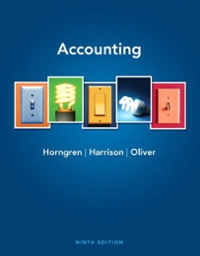Question
35.The dirty price of a bond is defined as the: Multiple Choice clean price minus any taxes due on the accrued interest. quoted price plus
35.The dirty price of a bond is defined as the:
Multiple Choice
- clean price minus any taxes due on the accrued interest.
- quoted price plus the accrued interest.
- clean price minus the accrued interest.
- market price minus any taxes due on the accrued interest.
- market price minus the accrued interest.
36.The principal amount of a bond that is repaid at the end of the loan term is called the bond's:
Multiple Choice
- yield to maturity.
- coupon rate.
- face value.
- maturity.
- coupon.
37.The rate of return required by investors in the market for owning a bond is called the:
Multiple Choice
- yield to maturity.
- coupon rate.
- maturity.
- coupon.
- face value.
38.A project has an initial cost of $26,000, a discount rate of 11.7 percent, a life of 5 years, and an NPV of $11,216. Given this, you know that the project is expected to earn a return:
Multiple Choice
- equal to 11.7 percent of $37,216 (= $26,000 + 11,216).
- of $26,000 minus $11,216.
- equal to 11.7 percent of $26,000 plus an additional $11,216.
- of $11,216 in total.
- of 11.7 percent of $11,216.
39.The specified date on which the principal amount of a bond is repaid is called the bond's:
Multiple Choice
- coupon rate.
- maturity.
- face value.
- yield to maturity.
- coupon.
40.Which entity provides a daily snapshot of bond prices for the most active issues?
Multiple Choice
- US Treasury Department
- SEC
- NYSE
- FINRA
- Federal Reserve Bank
41.If a firm is more concerned about the quick return of its initial investment than it is about the amount of value created, then the firm is most apt to evaluate a capital project using the _____ method of analysis.
Multiple Choice
- modified internal rate of return
- internal rate of return
- payback
- profitability index
- net present value
42.An investment is acceptable if the payback period:
Multiple Choice
- is negative.
- exceeds the life of the investment.
- is equal to, and only if it is equal to, the investment's life.
- is equal to or greater than some pre-specified period of time.
- is less than some pre-specified period of time.
43.Guggenheim offers a bond with annual payments and a coupon rate of 5 percent. The yield to maturity is 5.62 percent and the maturity date is 9 years away. What is the market price of one $1,000 face value bond?
Multiple Choice
- $942.66
- $868.67
- $1,009.59
- $869.67
- $957.12
44.Which one of these bonds is the most interest-rate sensitive?
Multiple Choice
- 5-year zero coupon bond
- 10-year, 6 percent, semiannual coupon bond
- 10-year zero coupon bond
- 5-year, 6 percent, annual coupon bond
- 10-year, 6 percent, annual coupon bond
45.When a firm commences a positive net present value project, you know:
Multiple Choice
- the present value of the expected cash flows is equal to the project's cost.
- the inherent risks within the project have been ignored.
- that all the projected cash flows will occur as expected.
- the stockholders' value in the firm is expected to increase.
- the project will pay back within the required payback period.
46.Which statement concerning the net present value (NPV) of an investment or a financing project is correct?
Multiple Choice
- A financing project should be accepted if, and only if, the NPV is exactly equal to zero.
- Any type of project with greater total cash inflows than total cash outflows, should always be accepted.
- An investment project that has positive cash flows for every time period after the initial investment should be accepted.
- An investment project should be accepted only if the NPV is equal to the initial cash flow.
- Any type of project should be accepted if the NPV is positive and rejected if it is negative.
47.The payback method of analysis:
Multiple Choice
- considers all project cash flows.
- discounts cash flows.
- has a timing bias.
- applies an industry-standard recoupment period.
- ignores the initial cost.
48.Rosina purchased one 15-year bond at par value when it was initially issued. This bond has a coupon rate of 7 percent and matures 13 years from now. If the current market rate for this type and quality of bond is 7.5 percent, then Rosina should expect:
Multiple Choice
- today's market price to exceed the face value of the bond.
- the bond issuer to increase the amount of all future interest payments.
- to realize a capital loss if she sold the bond at today's market price.
- the current yield today to be less than 7 percent.
- the yield to maturity to remain constant due to the fixed coupon rate.
49.Payback is frequently used to analyze independent projects because:
Multiple Choice
- it is easy and quick to calculate.
- it considers the time value of money.
- it produces better decisions than those made using either NPV or IRR.
- all relevant cash flows are included in the analysis.
- it is the most desirable of all the available analytical methods from a financial perspective.
Step by Step Solution
There are 3 Steps involved in it
Step: 1

Get Instant Access to Expert-Tailored Solutions
See step-by-step solutions with expert insights and AI powered tools for academic success
Step: 2

Step: 3

Ace Your Homework with AI
Get the answers you need in no time with our AI-driven, step-by-step assistance
Get Started


